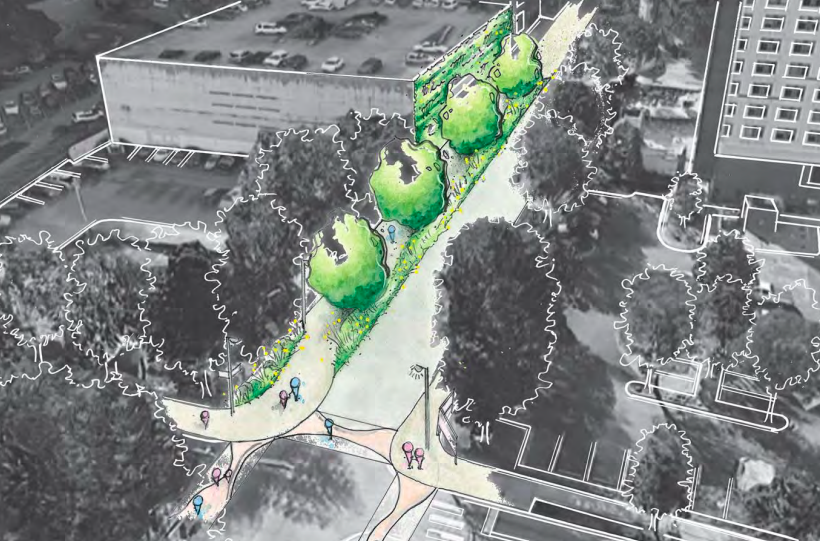Designing a More Resilient Transportation Corridor
The greening of Ted Turner Drive, a 1.4 mile roadway that cuts through Downtown Atlanta, was an opportunity to rethink the function and benefits of a transportation corridor into a gateway to downtown that could create bikeway infrastructure, allow for a better walking experience, absorb rainwater, mitigate heat, and beautify the public space.
Included in the City of Atlanta’s 2007 Urban Resilience Strategy was a focus on five key areas: water, energy, sustainability, social cohesion, and mobility. Rebuild worked with the City and Central Atlanta Progress to develop a student design competition, informed by community and stakeholder input, to solicit ideas for high impact interventions for this stretch of Ted Turner Drive.
Adhering to Rebuild’s model of collaborative research and design, teams of students from Georgia Tech University, University of Georgia, Clark Atlanta, and Morehouse College were brought together to participate in the competition. Each university committed to offering university and professor resources and most committed a course or club to the competition. The competition began in January 2018 with a day-long event that taught students about the history of the Drive and the surrounding downtown area, as well as the meaning of resilience infrastructure by showcasing case studies of multi-benefit designs from the Atlanta region and beyond. Each student group was paired with a mentor who is an active practitioner in the region in the fields of urban planning, architecture, or engineering.
The students embarked on an eight week research phase that included site analysis, field study, surveys, public observations, digital engagement, and interactive questionnaires placed throughout the area. Each mentor worked with a student team to help ground the students’ research and design in real-life practice by assisting with a work plan, creation of public engagement tools, design renderings, and messaging.
At the conclusion of the research stage, students began to develop “design opportunities” based on their research learnings. These opportunities were then used for the initial design ideas as students entered the design stage after spring break. Midway through the design phase, each team presented their preliminary proposals at a public event where residents, businesses, and stakeholders could give design feedback. Following the event, students used the last two weeks of the semester to incorporate the public feedback into their proposals before their final submissions, which were presented to a jury made up of local experts including a City Councilmember, City staff, and representatives from local organizations.
In 2018, the Atlanta Resilience Office and a City Council Member awarded the winners and finalists. The University of Georgia’s team won the design challenge for their work on the Spark Plan, which emphasized increasing the cultural, ecological, and economic benefits of Ted Turner Drive.The plan featured empowerment initiatives for addressing homelessness by increasing access to essential goods and resources through vending or wayfinding machines, and encouraging creativity and innovation by making Turner Drive a blank canvas for artists and innovators to showcase their ideas about resilience. The design also proposed ecologically enhancing the drive through water absorption, heat sequestration and biodiversity as well as activating certain areas with lane changes, widening of sidewalks and shutting down areas for special events.
The winning plan focused on enhancing the pedestrian experience through green infrastructure and ecological enhancements that address heat and excess water, while also creating larger sidewalks and multi-use spaces that can be sectioned off from traffic and utilized for large events. The City began implementing this proposal in the fall of 2018 using monies raised from Atlanta’s transportation bond.The City of Atlanta has set aside $5-7 million from the Renew Atlanta Bond to implement the entirety or a portion of the winning submission of this competition
This project created a model for sustainable and resilient street and sidewalk design in Atlanta, that can be replicated for future transportation corridors and city infrastructure projects. It also gave the City a model for engaging it’s deep pool of talented university students and professors, while training the next generation of architects, engineers, and urban planners in a resilience and multi-benefit framework. This model also created greater collaboration between the various Atlanta-based universities and enhanced connection between academics and the private sector.
You can download the case study here.

